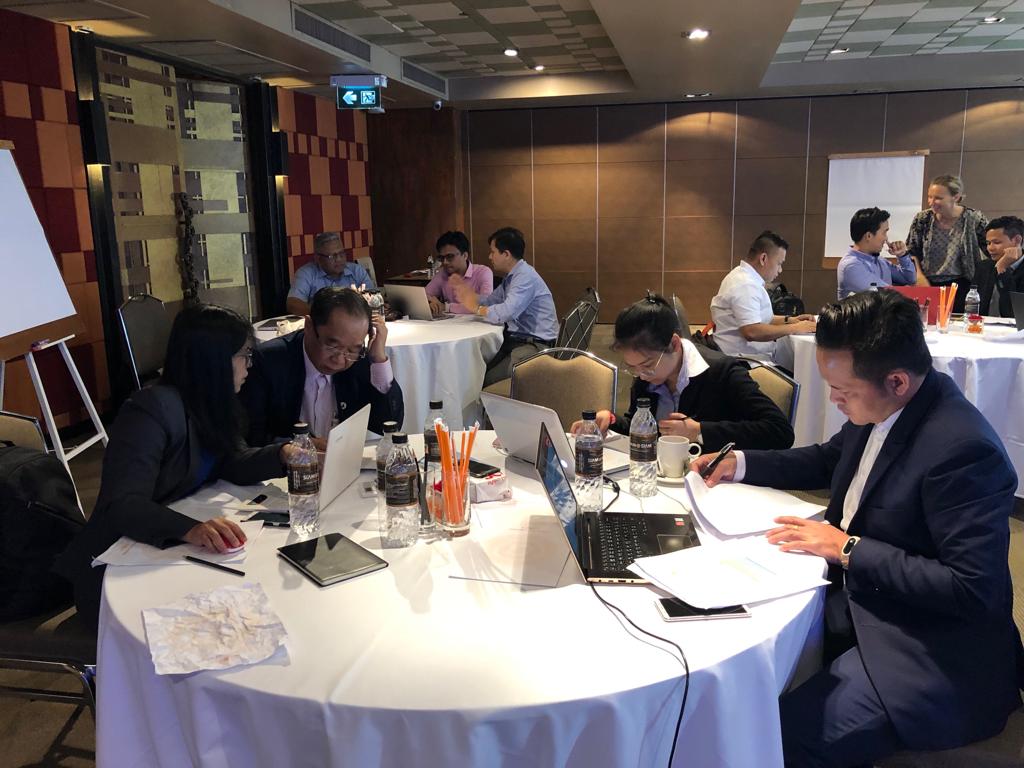Menu
 The ASEAN Centre for Energy (ACE) together with a team of international experts provided technical support to AMS as part of the ‘ASEAN Cooperative Project on Financing Mechanism Design for Energy Efficiency Project Implementation funded by the Japan – ASEAN Integration Funding (JAIF). Under that framework, ACE and the Department of Alternative Energy Development and Efficiency (DEDE), Thailand, organised the second workshop on ‘Energy Efficiency (EE) Financing Mechanisms and Innovative Possibilities to Accelerate EE investments in ASEAN’ on 25-28 March 2019 in Bangkok. The workshop aimed to present more financing initiatives for EE measures in the private sector, to solicit detailed feedback, and finalise the proposed national concept notes.
The ASEAN Centre for Energy (ACE) together with a team of international experts provided technical support to AMS as part of the ‘ASEAN Cooperative Project on Financing Mechanism Design for Energy Efficiency Project Implementation funded by the Japan – ASEAN Integration Funding (JAIF). Under that framework, ACE and the Department of Alternative Energy Development and Efficiency (DEDE), Thailand, organised the second workshop on ‘Energy Efficiency (EE) Financing Mechanisms and Innovative Possibilities to Accelerate EE investments in ASEAN’ on 25-28 March 2019 in Bangkok. The workshop aimed to present more financing initiatives for EE measures in the private sector, to solicit detailed feedback, and finalise the proposed national concept notes.
The workshop was attended by eight (8) ASEAN Member States (AMS); Cambodia, Indonesia, Lao PDR, Malaysia, Myanmar, the Philippines, Singapore and Thailand. The workshop was also attended by representatives of Private Financing Advisory Network (PFAN), Thailand Refrigeration and Air Conditioning Nationally Appropriate Mitigation Action (RAC- NAMA), SWITCH-Asia of European Union, Sustainable Energy for All (SE4All), and ASEAN Centre for Energy (ACE). During the workshop, participants received more insights into private sector’s initiatives, such as one by Private Financing Advisory Network (PFAN), who connects clean energy and EE project developers and investors in Asia, or the financing of EE efforts for small and medium-sized enterprises supported by Bank of the Philippine Islands.
The workshop allowed further exchange on EE financing schemes among the AMS. While Brunei Darussalam, Indonesia, Malaysia, Singapore, Thailand and Vietnam are focusing on mechanisms that would increase private sector’s investments, such as EE insurance, revolving funds or guarantees, Cambodia, Lao PDR, and Myanmar focus more on setting up the necessary framework conditions and on planning for EE regulations. The last three AMS also expect to prepare possible incentive programmes. Two EE proposals, one for SWITCH-Asia and one for NAMA facility reflect the concrete commitment of the AMS in this issue.
The site visit on the last day to AZBIL Amarin Plaza in Bangkok City provided participants with an opportunity to listen to the experience of an energy service company to fund and implement EE measures in commercial buildings in Thailand. They shared their challenges to convince customers of their services, as well as the need for public support.
The two workshops of the ASEAN Cooperative Project on Financing Mechanism Design for Energy Efficiency Project Implementation funded by the Japan – ASEAN Integration Funding will be reported to the 23rd Energy Efficiency and Conservation – Subsector Network (EE&C-SSN) Meeting. The Project will also release a study on identified EE finance mechanisms in ASEAN. Given the interest of the AMS, ACE will develop a follow-up proposal to continue the fruitful exchange among the AMS to accelerate EE investment in the region. (RJPS. Featured photo credit: ACE-JAIF)
